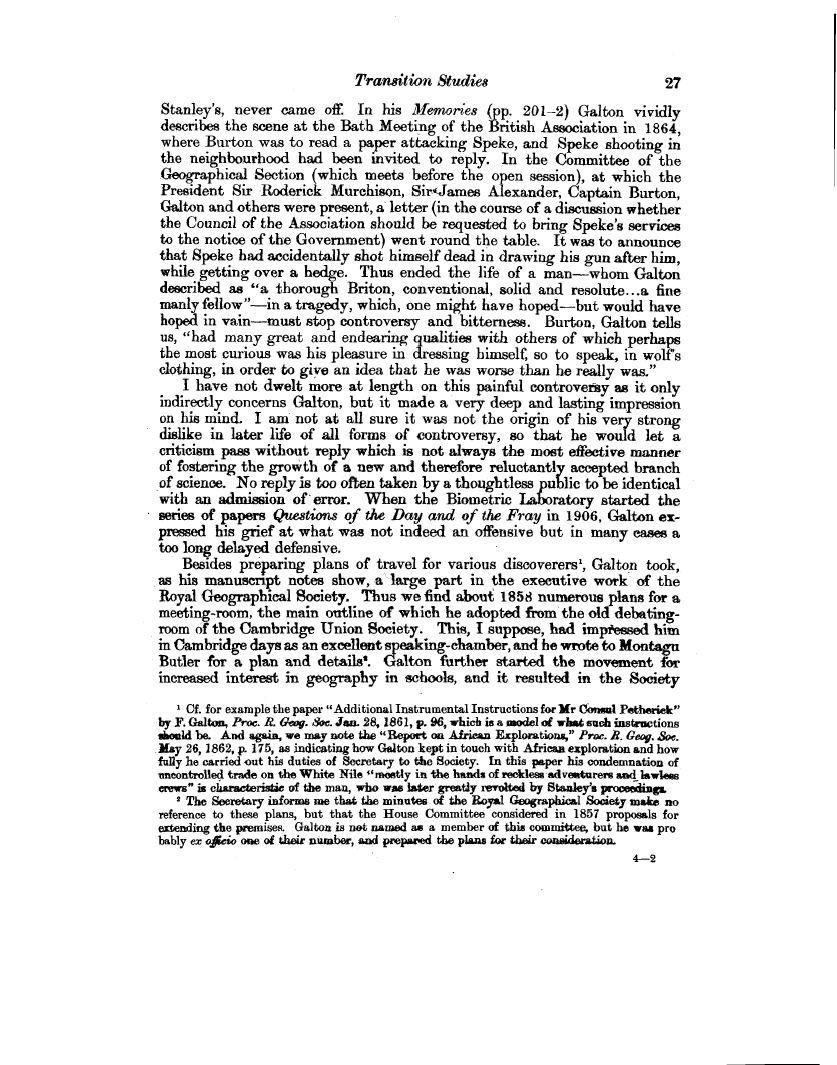Transition Studies 27
Stanley's, never came off In his Memories (pp. 201-2) Galton vividly describes the scene at the Bath Meeting of the British Association in 1864, where Burton was to read a paper attacking Speke, and Speke shooting in the neighbourhood had been invited to reply. In the Committee of the Geographical Section (which meets before the open session), at which the President Sir Roderick Murchison, Sir4ames Alexander, Captain Burton, Galton and others were present, a 'letter (in the course of a discussion whether the Council of the Association should be requested to bring Speke's services to the notice of the Government) went round the table. It was to announce that Speke had accidentally shot himself dead in drawing his gun after him, while getting over a hedge. Thus ended the life of a man-whom Galton described as "a thorough Briton, conventional, solid and resolute ... a fine manly fellow "-in a tragedy, which, one might have hoped-but would have hoped in vain-must stop controversy and bitterness. Burton, Galton tells us, "had many great and endearing qualities with others of which perhaps the most curious was his pleasure in dressing himself, so to speak, in wolfs clothing, in order to give an idea that he was worse than he really was."
I have not dwelt more at length on this painful controversy as it only indirectly concerns Galton, but it made a very deep and lasting impression on his mind. I am not at all sure it was not the origin of his very strong dislike in later life of all forms of controversy, so that he would let a criticism pass without reply which is not always the most effective manner of fostering the growth of a new and therefore reluctantly accepted branch of science. No reply is too often taken by a thoughtless public to be identical with an admission of error. When the Biometric Laboratory started the series of papers Questions of the Day and of the Fray in 1906, Galton expressed his grief at what was not indeed an offensive but in many cases a too long delayed defensive.
Besides preparing plans of travel for various discoverers', Galton took, as his manuscript notes show, a -large part in the executive work of the Royal Geographical Society. Thus we find about 1858 numerous plans for a meeting-room, the main outline of which he adopted from the old debatingroom of the Cambridge Union Society. This, I suppose, had impi;essed him in Cambridge days as an excellent speaking-chamber, and he wrote to Montagu Butler for a plan and details'. Galton further started the movement for increased interest in geography in schools, and it resulted in the Society
1 Cf. for example the paper "Additional Instrumental Instructions for Wr Consul Pethersek" by F. Galten, Proc. R. Gwy. Soc. Jan. 28, 1861, p. 96, which is a model of what such instructions should be. And again, we may note the "Report on African Explorations," Proc. R. Geog. &0. May 26, 1862, p. 175, as indicating how Galton kept in touch with African exploration and how fully he carried out his duties of Secretary to the Society. In this paper his condemnation of uncontrolled trade on the White Nile "° mostly in the hands of reckless adventurers and lawless crews" is characteristic of the man, who was later greatly revoked by Stanley's
2 The Secretary informs we that the minutes of the Royal Geographical Society make no reference to these plans, but that the House Committee considered in 1857 proposals for extending the premises. Galton is not named as a member of this committee, but he was pro bably ex oicio one of their number, sad prepared the plans for their n.
4-2

